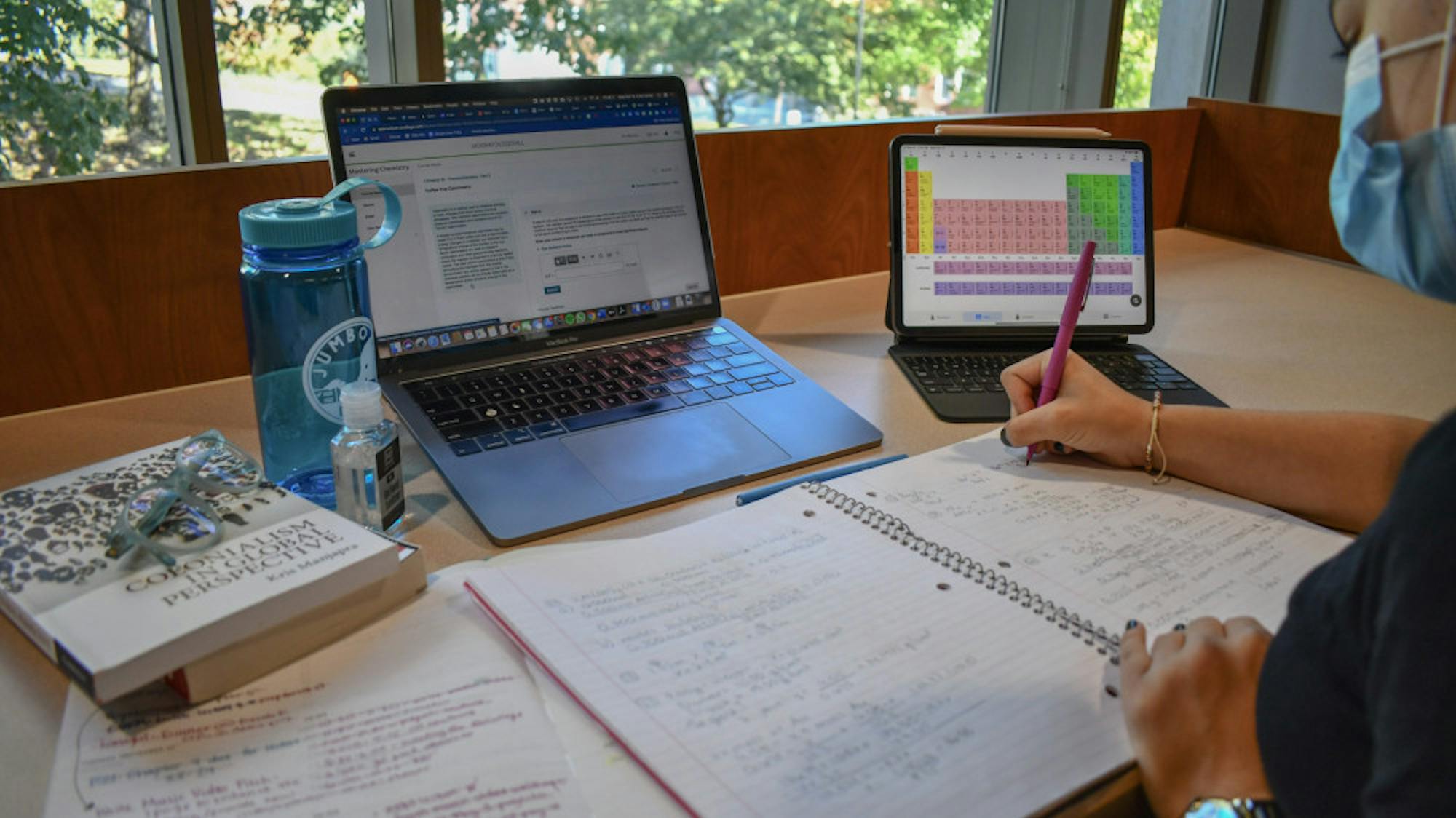At the start of the pandemic in March 2020, Tufts University announced that, for the next three years, prospective students would not be required to submit SAT or ACT scores with their applications. Tufts has historically mandated these test scores as a part of the application for undergraduate admissions, so this change will allow applicants greater flexibility. According to some professors and students, the change is also a significant step toward equity and inclusion in college admissions.
The unique obstacles prospective students are facing due to COVID-19 were the main push for Tufts’ Office of Undergraduate Admissions to implement this new policy, according to JT Duck, dean of admissions and enrollment management at Tufts.
“Very suddenly last spring, high school students faced an enormous amount of uncertainty about how to balance their school commitments, stay connected to their friends, stay healthy, and support their families. Taking a standardized test for college admissions should not have been at the forefront of their thinking,” Duck wrote in an email to the Daily. “We wanted to take the issue of testing off the plate of any high school student … considering applying to Tufts and allow them to focus on their immediate world.”
Alongside the additional stress of balancing the pandemic, the Office of Undergraduate Admissions was concerned that standardized tests would not be offered as frequently.
“Historically, many of our applicants have taken the ACT or SAT in the spring of junior year, and sat for it again in the fall of senior year," Duck said. "With various testing dates being curtailed or canceled in the spring, we worried that students who could be great matches for Tufts would not have access to the exams on a reasonable timeline, or the opportunity to submit scores that they felt reflected their best performance."
While the test-optional policy was originally brought on by COVID-19, it has sparked other conversations around college admissions. Professors and students on campus are questioning the legitimacy of these tests.
Erin Seaton, co-director of educational studies, favors this new policy and explains the inequities behind standardized tests.
“How you do on a standardized test isn't a measure of one student against another. It's a measure of the systemic privileges that you've had throughout your education. That could be, access to classes, curriculum, textbooks, tutoring and parental support,” Seaton said. “It was always a measure of inequality. To use that as a standard never worked in the first place.”
Natasha Warikoo, professor of sociology, shared similar thoughts on the exclusivity of standardized tests.
“We know that SAT scores are highly correlated to family income … and that they're not good predictors of the grades that people are even going to get in college,” Warikoo said. “These standardized tests create more inequality and they don't do a very good job of even predicting who is going to be successful.”
Taking the emphasis off of standardized test scores means that the Office of Undergraduate Admissions can holistically evaluate other components of the application and give prospective students a better chance to express themselves.
“In our first year of being test-optional, we are intentionally reducing and reimagining the role of the SAT and ACT in our process," Duck said. "In practice, that means we are leaning into curricular rigor, class performance and grades [and] insights gleaned from letters of recommendation."
Seaton found cumulative evaluation to be a better indicator of how well a student would perform at Tufts.
“I would suggest looking very holistically...at students’ ability to think critically about themselves in the world. We want students that are going to be able to carry that into the classrooms at Tufts,” Seaton said. “That could include interpersonal relationships. How do you work with other people? What do your recommenders say about you as a human?”
According to Warikoo, the inequities of college admissions lie not only in standardized tests. They are also ingrained in different high schools’ education structures and offered extracurricular activities.
“We can't assume that just getting rid of the SAT or the ACT is going to lead to equity necessarily. We need to think, well, what's the alternative?” Warikoo said. “If we’re placing more emphasis now on extracurricular achievement [we have to think about that]. Extracurriculars are also a domain that are unequally accessible to kids. If you're going to be a star athlete or a star musician, you're going to need a lot of coaching … which costs a lot of money, or private coaching or private music lessons or an expensive instrument.”
Warikoo believes the best way to evaluate a student is by looking at their high school grades.
“Grades are some measure of, ‘Did you go to class? Did you get your work done? Did you study for your tests?’ All schools have grades and there are top performers in every school,” Warikoo said. “A's are distributed [more] equitably than are high scores on the SAT [or ACT].”
Sophomore Mindy Duggan, who is studying child studies and human development, felt that her standardized test scores did not accurately reflect her academic performance.
“I was actually worried about submitting my scores because I wasn't sure that they reflected my abilities as a student,” Duggan said. “It was definitely stressful on my part to see that score and kind of compare it to like my grades in my classes. They didn't quite match up. If I had the option not to submit those I definitely would not have.”
Duggan sees this new policy as a way of reaching different types of students and learners.
“It's a way to be more inclusive. I know some people aren't the best test-takers," Duggan said. "I know in high school I was not the best test taker and I did not look forward to taking the SATs or ACTs, I'm very much an essay-based [student]."
According to Warikoo, the underrepresentation of minority groups is a drastic issue in college admissions everywhere. Having test-optional policies might reduce some of these disparities.
“I think [colleges are] not so good at identifying young people with potential who are from disadvantaged groups. I don't think that's unique to Tufts, but I do think that is a problem,” Warikoo said. “The reality is that there are so many amazing young people in this country who could thrive at a place like Tufts. So why not have a class that more reflects the kind of distribution of 18 year olds in the country?”
Seaton predicts that the removal of standardized tests will create more space for students with learning disabilities.
“I teach a class about learning disabilities for students with learning disabilities. [Standardized tests are] a huge barrier and not a measure at all [of] their academic abilities.” Seaton said.
In addition to opening pathways for students with learning disabilities, she believes it will open doors for minority groups.
“[Standardized tests are] a measure that is directly correlated with wealth and with racist ideologies, so [the test optional policy] opens up pathways for students of color. It opens up pathways for students that speak English as a second language. It opens up a path for students that come from economically disadvantaged backgrounds,” Seaton said.
The Office of Undergraduate Admissions has already seen a more diverse applicant pool this year, after the implementation of the test-optional policy.
“For the Class of 2025, there are more than 31,190 first-year applicants, a 35% increase over last year. This year’s applicant pool is also the most diverse on record. For the first time, students of color comprise a majority of U.S. applicants: 51%. About half of all applicants did not submit SAT or ACT scores,” Duck said. “The size, depth and diversity of this year’s pool is the result of many changes we made to our admissions process, including our test-optional policy in response to COVID-19.”
Many more barriers will have to be removed for Tufts to become a more inclusive institution, but Seaton and Warikoo think going test-optional for the next three years is a good start.
“We really have to be thinking about the systems and the structures that we are a part of," Seaton said. "This focus on standardized testing as a measure for admissions can't hold with being an anti-racist institution.”






